Humanities & Social Sciences
Council Chair Calls for Integration of CERTL Initiatives into University Processes
Published
1 year agoon
By
Jane Anyango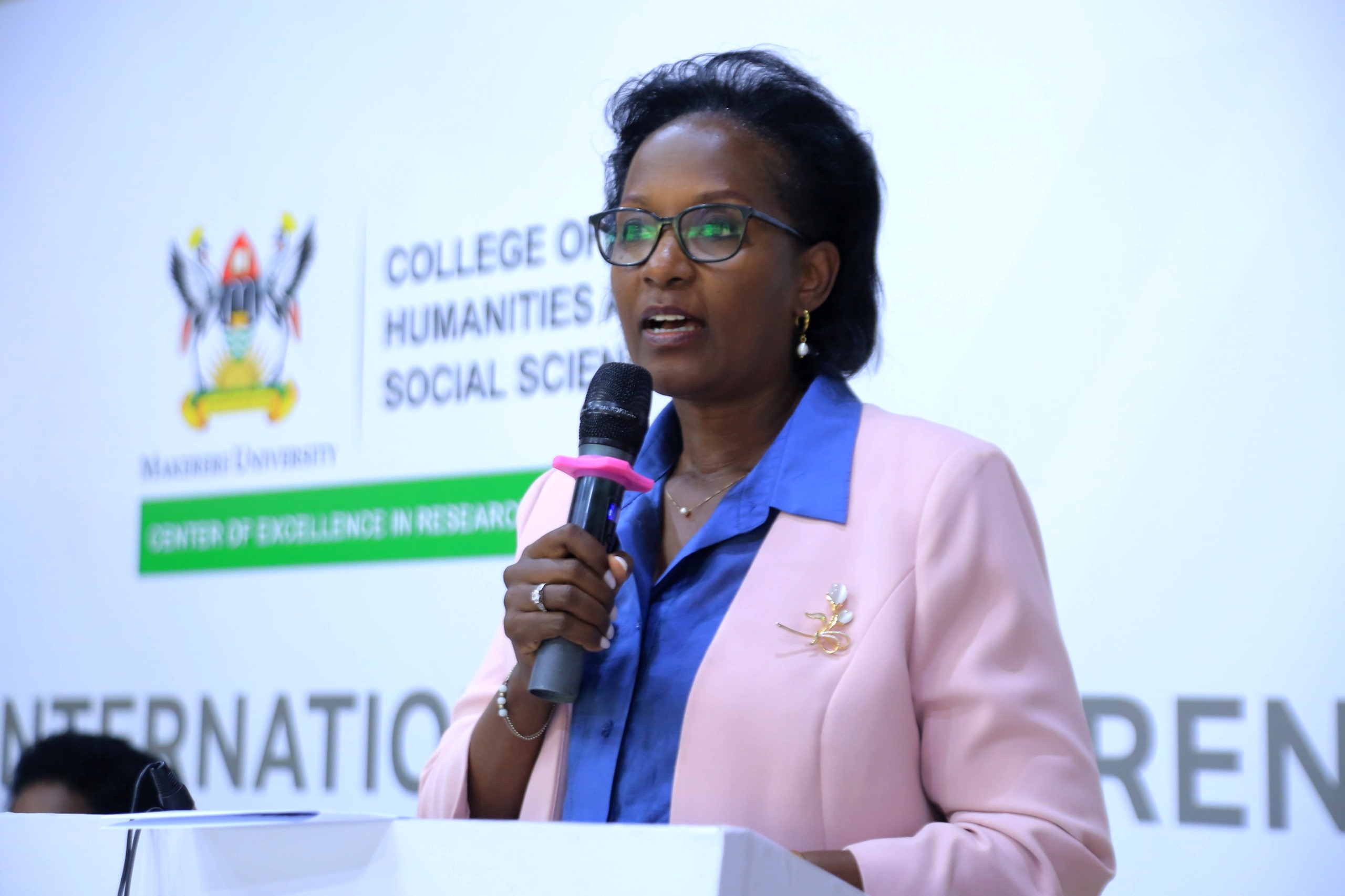
The Chairperson of Makerere University Council, Mrs. Lorna Magara, has called for the university-wide standardization of CERTL initiatives to strengthen its research-led transformation. Mrs. Magara made this call while presiding over the opening ceremony of the 2024 CHUSS Centre of Excellence in Research, Teaching, and Learning (CERTL) International Conference on November 14, 2024, at Fairway Hotel in Kampala.
The conference, under the theme, “Leveraging Centers of Excellence to enhance Makerere University‘s teaching, research, and learning landscape”, brought together academics, project leaders, keynote speakers, and panelists. Mrs. Magara acknowledged the crucial role of partners like the Mellon Foundation and Gerda Henkel Foundation in supporting the College of Humanities and Social Sciences (CHUSS) and advancing the university’s strategic objectives. The College received a $800,000 grant from the Mellon Foundation to support the establishment of CERTL, aiming to strengthen research, teaching, and learning in the Humanities and Humanistic Social Sciences at Makerere University.
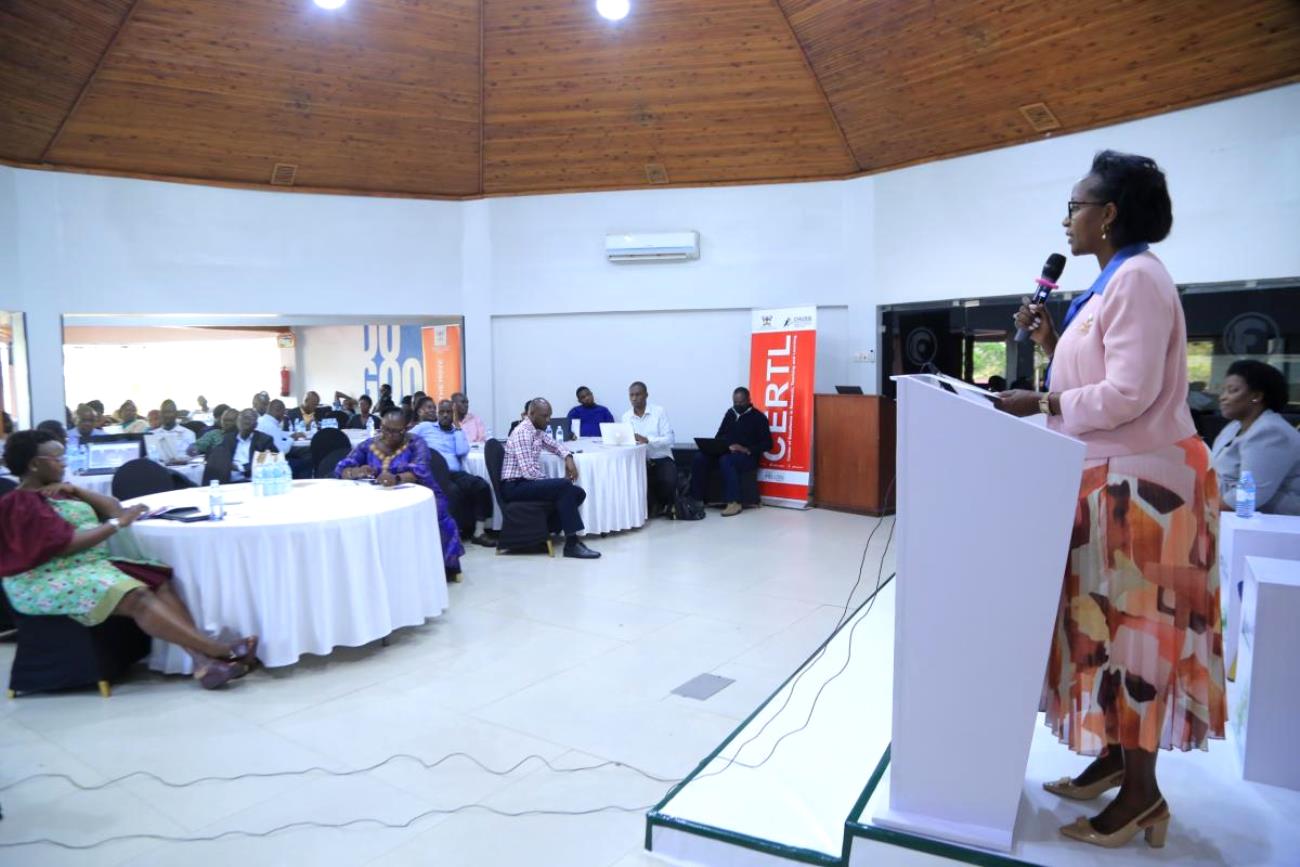
Launched on September 16, 2020, CERTL has provided Makerere University faculty with opportunities to enhance their research, teaching, and learning practices. It has fostered renewal and pedagogical growth among senior faculty, created space for peer debates on academic practices, and supported curriculum design and pedagogical innovations within the college.
In her opening remarks, Mrs. Magara highlighted Makerere’s 2020-2030 Strategic Plan, emphasizing the transition from a teaching-focused to a research-led institution. She identified four key pillars: deepening research, building industry partnerships, fostering an innovative academic environment, and ensuring inclusive governance. She noted that CERTL’s contributions in research skills training, scholarly writing, and curriculum reorientation are setting a model that can be replicated across other colleges.
“CERTL’s mission to enhance research, teaching, and learning is perfectly aligned with Makerere University’s direction. Initiatives such as New Hires’ Workshops and the RATE (Reflect, Articulate, Translate, and Evaluate) framework are models that can enrich our academic practices university-wide,” Mrs. Magara said, encouraging the integration of CERTL’s frameworks across the institution.
Recognizing CERTL’s achievements, including over 40 publications and significant contributions to curriculum reforms, Mrs. Magara urged Makerere University’s leadership to expand CERTL’s mandate. “We look to CERTL as a catalyst to drive innovative approaches in teaching, research, and curriculum development, setting a foundation for a research-led institution,” she declared, officially opening the conference.
This international conference marks the conclusion of the CERTL project after four years of implementation at Makerere University. The project was conceived by the then Principal of CHUSS, Prof. Edward Kirumira, and suported by the then Dean, School of Languages, Literature and Communication and now, Vice Chancellor of Uganda Christian University, Prof. Aaron Mushengyezi. The project has been led by the immediate former Principal of CHUSS, Prof. Josephine Ahikire, as Principal Investigator, with Dr. Edgar Nabutanyi and Dr. Levis Mugumya serving as Co-Principal Investigators and coordinators.
CHUSS Principal Assoc. Prof. Nkabala Highlights Pursuit of Excellence in Teaching and Research
CHUSS has been intensifying efforts to establish itself as a center of excellence in teaching, learning, and research through the CERTL project, according to CHUSS Principal, Associate Professor Helen Nabalirwa Nkabala.
Speaking at the conference, Prof. Nkabala commended the CERTL team’s dedication to creating a rich academic environment that prioritizes mentoring early-career researchers, accessibility for students with disabilities, and a collaborative approach to research. “We are not only here to conduct research but to make a significant impact on teaching and learning. We aim to lead Makerere into becoming a strong teaching and learning institution,” she said, emphasizing that CHUSS is “moving in the direction of excellence” by building on the strong foundation laid by previous faculty members.
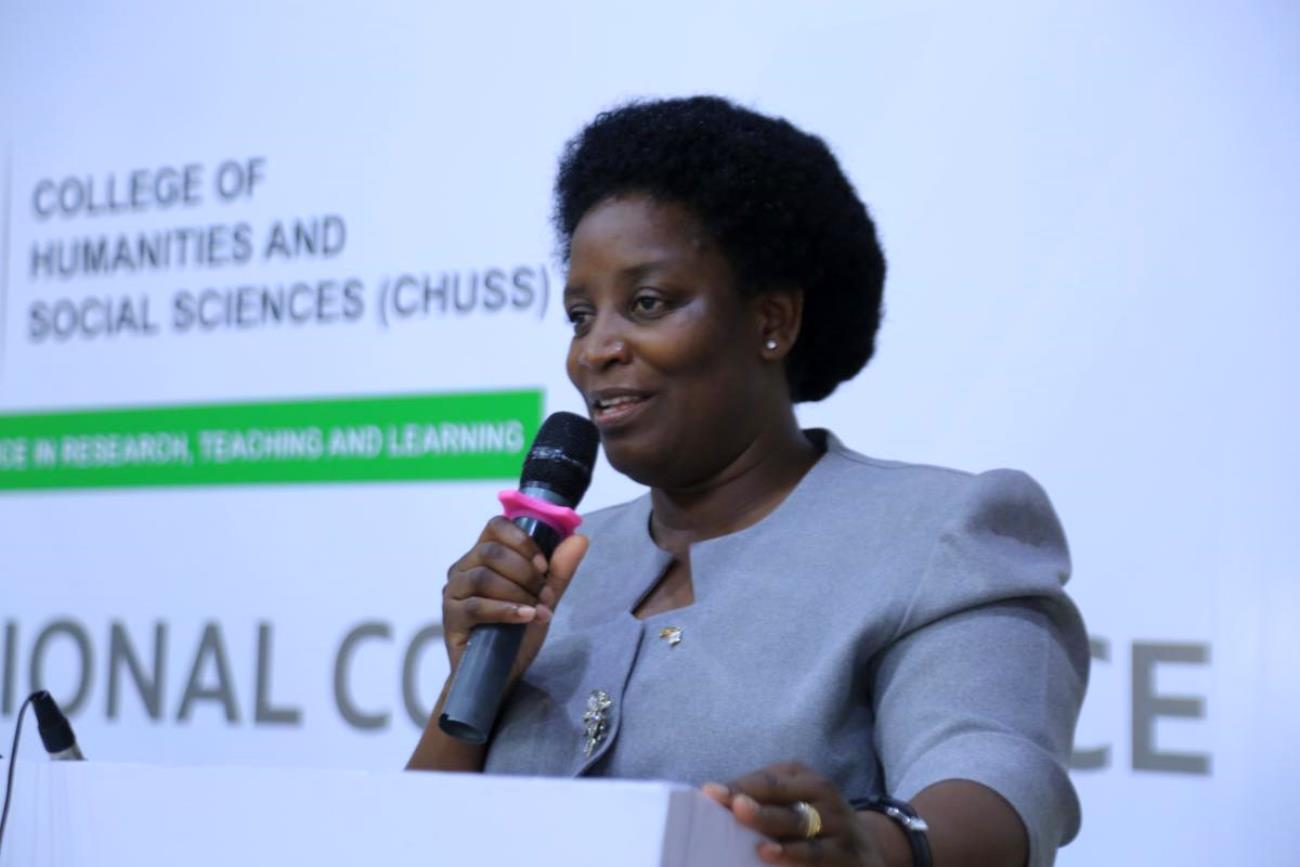
Prof. Nkabala expressed her gratitude to the college’s leadership, particularly recognizing Professor Josephine Ahikire, the Principal Investigator of the CERTL project, which has been instrumental in advancing teaching strategies and research since 2020. “CERTL has allowed us to look at research from a new perspective and address the unique needs of students with disabilities,” she remarked, reflecting on the project’s role in promoting inclusivity and high standards in education.
She also acknowledged the contributions of key CHUSS faculty, including Dr. Levis Mugumya, Dr. Edgar Nabutanyi, and Dr. Pamela Khanakwa, in strengthening the college’s research efforts. “The dedication of our staff, including our registrars and administrative team, has been indispensable,” she added.
Looking ahead, Prof. Nkabala advocated for enhancing CHUSS’s interdisciplinary contributions across Makerere University, particularly through Communication Skills courses, which play a crucial role in academic writing and teaching methodologies. She hinted at a potential restructuring to further strengthen the English language and literature programs, emphasizing their critical role in achieving the college’s academic goals.
In her conclusion, Prof. Nkabala expressed her hope for continued collaboration with Makerere’s leadership in advancing the college’s academic mission, stating, “With the support of university leadership, we can firmly establish CHUSS as a model of excellence.”
“CERTL isn’t just a physical center; it’s a guiding vision across various colleges- PI Prof. Josephine Ahikire
The Principal Investigator of the CERTL project, Professor Josephine Ahikire, underscored the importance of the humanities in today’s academic landscape. In her address,, Prof. Ahikire highlighted the challenges humanities disciplines face, particularly in the wake of declining funding and the rise of digital learning technologies.
“Our goal from the beginning was to strengthen the humanities and address the impact of neoliberal reforms, rising enrollment, and budget cuts,” Prof. Ahikire explained. “We’re now at a point where we need to reinvent how we teach and inspire students, especially with the advent of artificial intelligence, to promote genuine learning rather than mere rote usage of digital tools.”
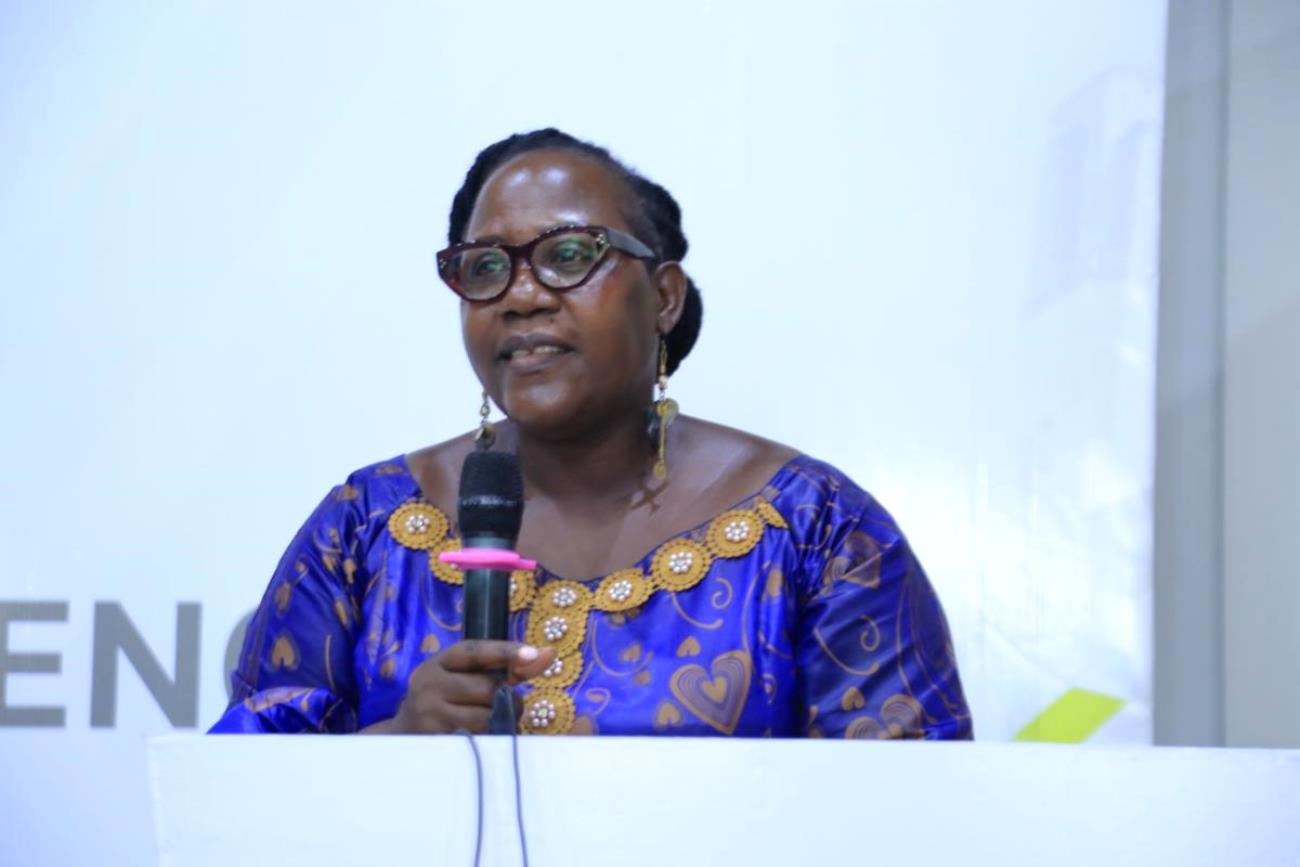
Acknowledging the CERTL project’s achievements, Prof. Ahikire stressed that the program remains focused on evolving beyond a single project into a sustained vision for the humanities at Makerere. “CERTL isn’t just a physical center; it’s a guiding vision that has extended its reach across various colleges at the university,” she said, applauding the project’s impact on new faculty training across departments.
Prof. Ahikire expressed confidence in the leadership of CHUSS Principal, Associate Professor Helen Nabalirwa Nkabala, and pledged to support her in advancing the college’s mission of academic excellence. “CHUSS is deeply committed to a research-led approach, and the work being done is truly impressive,” she assured attendees.
Prof. Ahikire concluded by emphasizing the college’s dedication to fostering a robust future for the humanities at Makerere University: “We continue to seek excellence as we build for the future, confident in the importance of the humanities to the intellectual core of our university.”
Dr. Edgar Nabutanyi Outlines CERTL Project Successes and Ambitious Goals for Humanities at Makerere Conference
Dr. Edgar Nabutanyi, Co-Principal Investigator of Makerere University’s Centre of Excellence in Research, Teaching, and Learning (CERTL), outlined the project’s significant achievements and ambitious goals. He acknowledged the crucial support from key figures such as the former and current CHUSS Principals, Professors Helen Nkabala and Josephine Ahikire, and Deputy Prof. Eric Awich, as well as Professor Edward Kirumira, whose efforts secured funding from the Mellon Foundation. Dr. Nabutanyi also paid tribute to Dr. Elias State and Professor Aaron Mushengyezi for their role in fostering international partnerships.
According to Dr. Nabutanyi, CERTL has made notable strides in advancing research, teaching, and learning in the humanities. Though the target of 36 annual workshops wasn’t fully achieved, a significant number of workshops were successfully held, focusing on scientific writing, academic presentation skills, and scholarly publication. These workshops have contributed to strengthening academic rigor among graduate students and faculty.
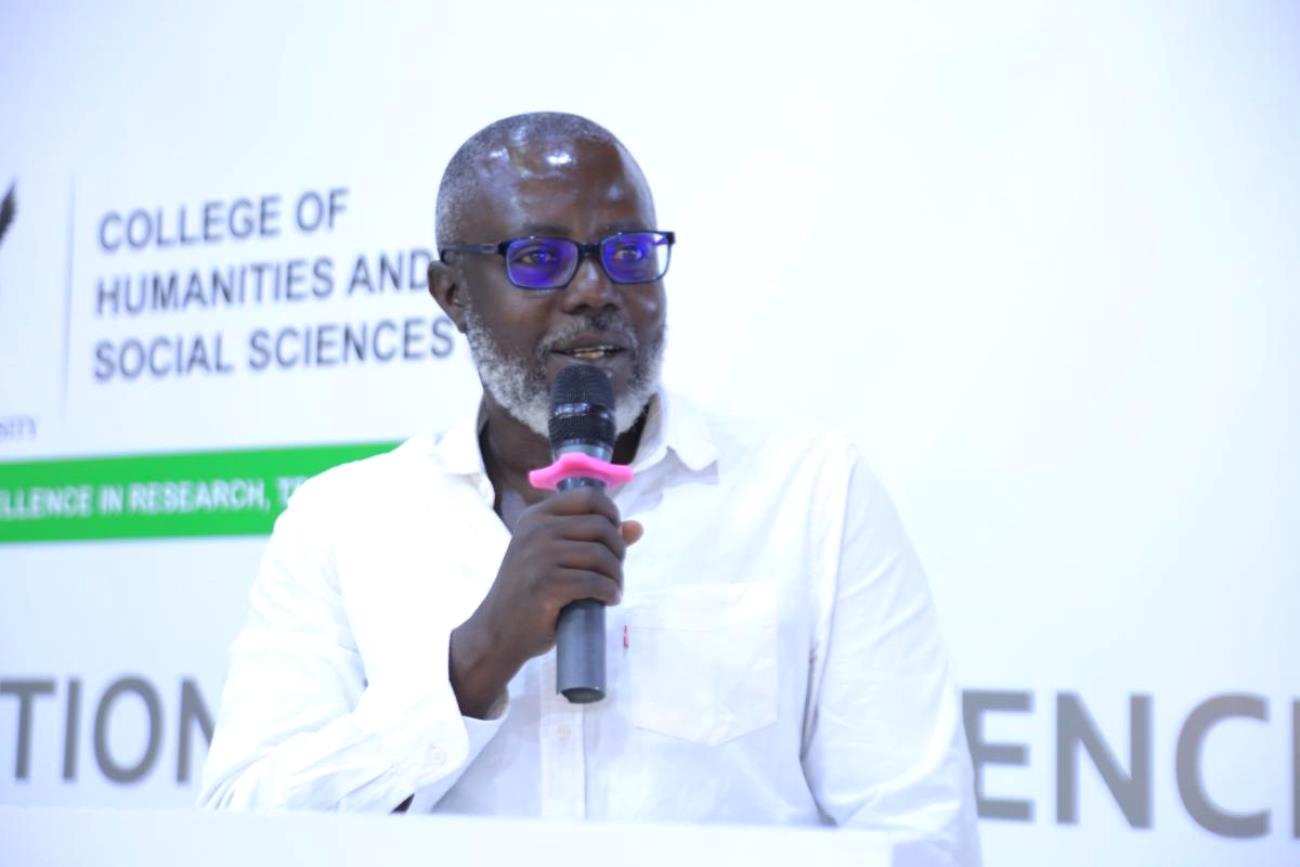
One of CERTL’s key contributions, as highlighted by Dr. Nabutanyi, is its scholarly writing and publication initiatives. The project sponsored retreats focused on publication writing, leading to the development of several research articles and two curated special issues. These efforts have helped bring Global South perspectives to academic publishing, with journals like Mawazo and the Journal of Languages, Literature, and Communication offering critical platforms for these voices.
Another major achievement, Dr. Nabutanyi noted, is the development of a scholarly book, which consolidates insights from CERTL’s workshops and research initiatives. The book, which is nearing completion, will serve as an essential resource for teaching, research, and academic management in the Global South. Dr. Nabutanyi hinted at an upcoming formal launch event for the book.
Through Mellon Foundation funding, CERTL has provided research grants to Makerere faculty members across various academic fields. These grants have supported research on topics ranging from literature and disability studies to identity and pedagogy. Prominent contributors, as mentioned by Dr. Nabutanyi, include Dr. Peace Musimenta, Dr. Danson Kahyana, Dr. Sarah Nakijoba, Dr. Isaac Tibasiima Dr. Caesar , Dr. John Barugahare, Dr. James Wasike and others. These funded projects will enrich the academic discourse and contribute to future CERTL publications and curriculum innovations.
Dr. Nabutanyi also emphasized CERTL’s commitment to inclusivity and accessibility in academia. He pointed to ongoing research by Dr. James Wasike on disability in education, which has identified barriers faced by students with disabilities. Despite progress in enrolling students with disabilities, challenges remain, particularly in adapting teaching models to cater to diverse needs. CERTL, he noted, is committed to integrating findings from this research into future academic offerings.
Proposed Initiatives
Dr. Edgar Nabutanyi, proposed several key initiatives aimed at furthering the impact of the project on humanities research and teaching. He emphasized the importance of creating tailored pedagogical modules to accommodate students with disabilities. Dr. Nabutanyi highlighted Dr. Wasike’s research on disability as a cornerstone in shaping these modules, which would be designed to meet the diverse learning needs of students and foster a more inclusive academic environment at Makerere.
Dr. Nabutanyi also identified the need for comprehensive orientation workshops for newly hired faculty at Makerere, something previous workshops had indicated as beneficial. He proposed regular training sessions for new staff, as well as ongoing workshops for current faculty to engage with the latest teaching innovations, including the integration of artificial intelligence. These initiatives, he noted, would help align faculty members with best practices and address pedagogical challenges at the university, ensuring a cohesive and forward-thinking approach to teaching.
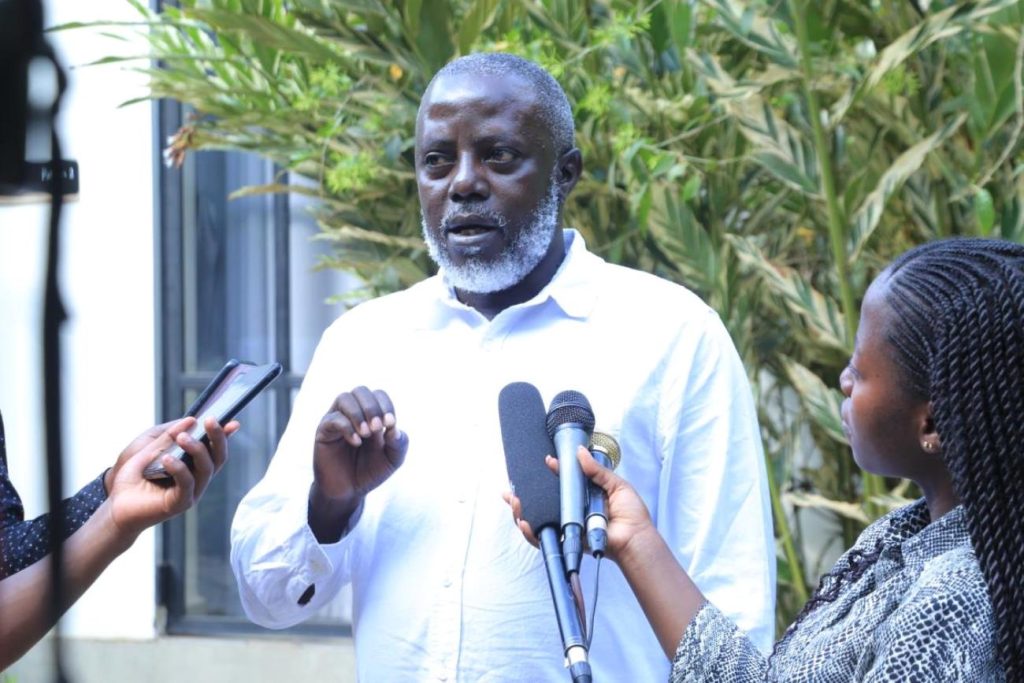
In addition to faculty development, Dr. Nabutanyi suggested the establishment of a “Best Teacher Award” to recognize and celebrate excellence in teaching. Drawing inspiration from similar programs at other institutions, he proposed this initiative be presented to Makerere’s Quality Assurance and Academic Registrar’s offices. The award would not only honor exceptional faculty members but also serve as an incentive for continued innovation in teaching and dedication to student success.
Dr. Nabutanyi further emphasized the importance of sustaining the academic community that CERTL has cultivated, which includes early-career and senior scholars committed to research and teaching excellence. He proposed incorporating periodic writing workshops and scholarly retreats into Makerere’s academic calendar to ensure that the momentum generated by CERTL’s initiatives continues to thrive. These activities would provide continued support for faculty development and scholarly collaboration.
In closing, Dr. Nabutanyi expressed his gratitude to the administrative team whose dedication has been instrumental in CERTL’s accomplishments. He acknowledged their hard work, which has enabled the smooth execution of workshops, conferences, and other activities. Dr. Nabutanyi concluded by reflecting on the transformative power of targeted funding and community building in the humanities, expressing optimism that the progress made through Mellon Foundation funding would inspire sustained engagement with the humanities at Makerere. He is confident that these proposed initiatives, including the creation of inclusivity modules, faculty orientations, and continued scholarly publications, will further solidify CERTL’s impact in the region.
You may like
-


Mak News Magazine: February 2026
-
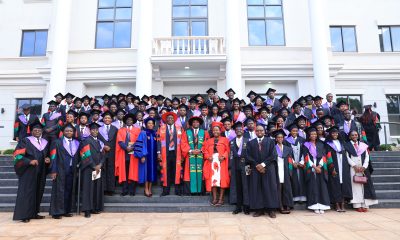

Mak 76th Graduation kicks off: SoL hailed as a Centre of academic Excellence
-
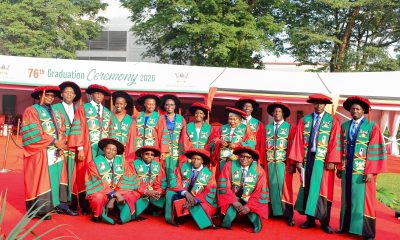

Mak 76th Graduation Ceremony: CEES Celebrates Academic Excellence, with 27 PhDs
-


76th Graduation Highlights
-


Mak Selected to Host Alliance for African Partnership Africa Office
-


Mak hosts First African Symposium on Natural Capital Accounting and Climate-Sensitive Macroeconomic Modelling
Humanities & Social Sciences
Meet Najjuka Whitney, The Girl Who Missed Law and Found Her Voice
Published
1 week agoon
February 23, 2026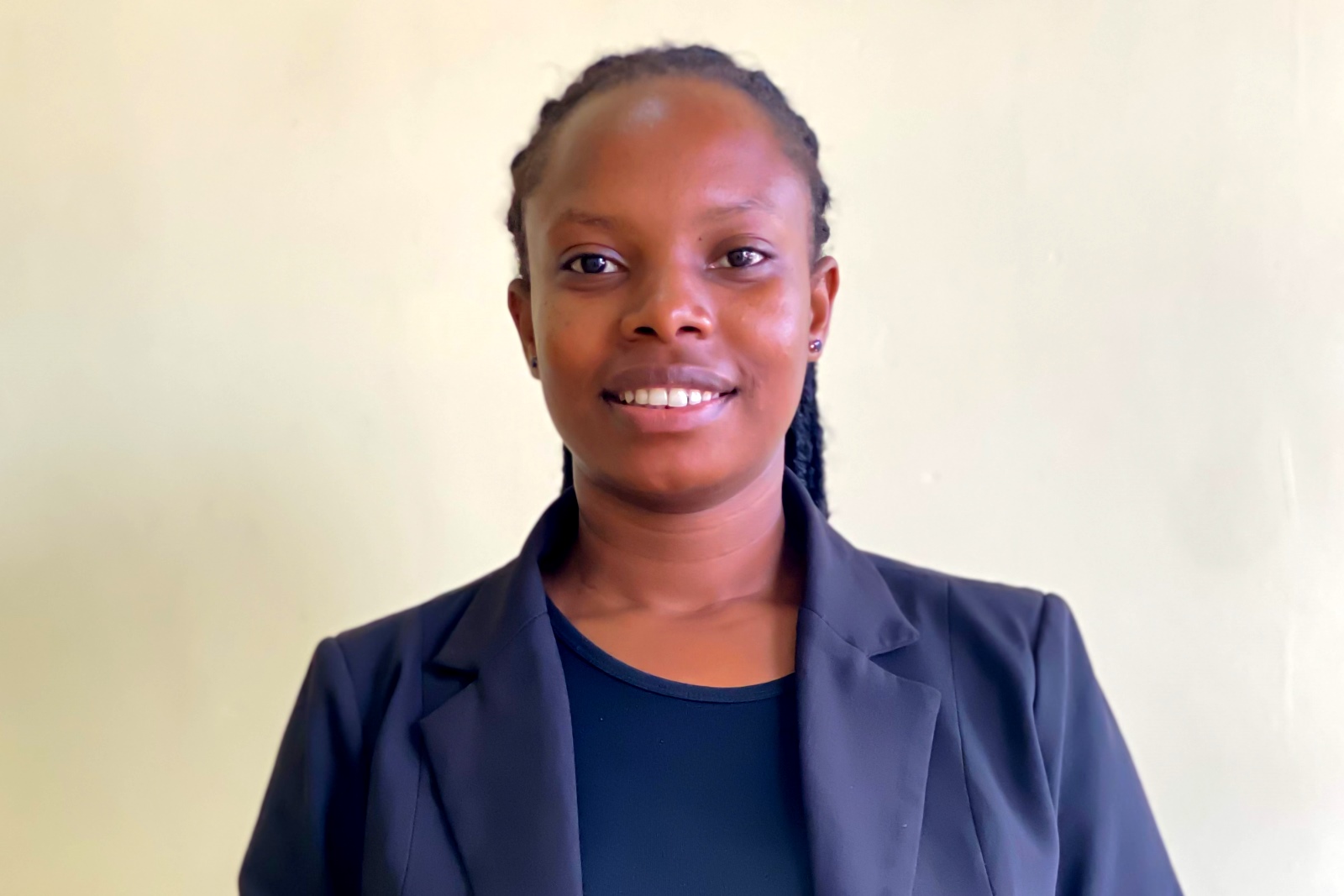
On the morning of Friday, February 27, when the academic procession winds its way across Makerere University’s Freedom Square for the last day of the 76th Graduation Ceremony, Whitney Najjuka will walk into history with a number beside her name: 4.46.
At Makerere, that number means First Class Honours. It means the Vice Chancellor’s List. It means she graduates as the only First-Class student in Journalism and Communication this year. But numbers, as Whitney has learned, rarely tell the full story.
Born on March 27, 2002, in Nabbingo, Kyengera Town Council, to Margaret Kusemererwa and Fred Kasirye, dreamt she would do Law, one of the disciplines, prestigious, almost inevitable next steps for a student who had excelled in secondary school. She had done everything correctly. Studied hard. Scored well. Followed the script.
But Makerere University had other plans. She missed the pre-entry mark, but found her name under Journalism and Communication, another prestigious course offered by the Journalism and Communication Department at Makerere University.
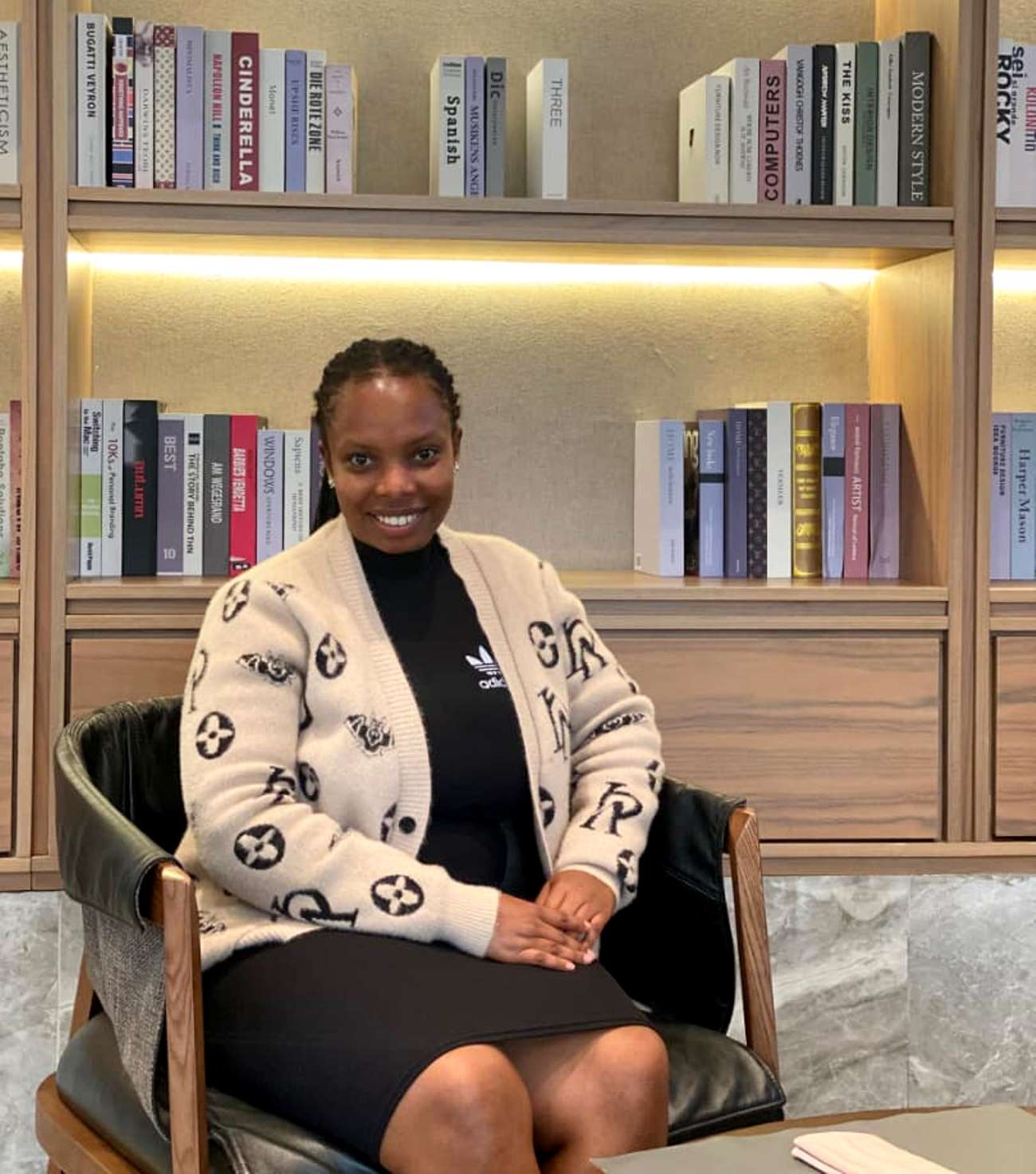
Najjuka began her academic journey at Muto Primary School in Buwama, earning 8 aggregates in the Primary Leaving Examination, a performance that positioned her strongly for secondary school.
She would later join St. Lucia Hill School, Namagoma, where she earned 20 aggregates at O-Level and 17 points in History, Luganda, and Divinity at A-Level.
Missing her dream course, Law, felt at first, like a detour. But Whitney was encouraged by Sanyu Christopher, her uncle, and she settled for a government-sponsored slot in the Bachelor of Journalism and Communication at Makerere, which she had applied for before.
She entered uncertain. But she graduates transformed.
The Pivot That Became a Purpose
Whitney speaks of her early university days with candor. She did not arrive at the Department of Journalism and Communication with a burning childhood ambition to be a journalist, but because another door had closed.
Then, Social and Behavior Change Communication happened. Applied Strategic Communication happened. She began to see media not as headlines and microphones, but as architecture, shaping how societies think, argue, and act.
The turning point came in her third year. The Female Journalist Foundation published her story on Sexual Gender-Based Violence (SGBV) and its emotional toll on survivors. What startled her was not its publication but the reaction. Comments flooded in. Debates ignited, especially about the role of men in combating GBV.
“I realized media doesn’t just report,” she says. “It frames how society views a crisis.”
Her voice, once tentative, had entered a national conversation.
The Discipline Behind 4.46
At Makerere University, a First Class CGPA is not built on brilliance alone but on ritual.
Whitney’s ritual began with showing up, on time, every time. She treated lectures as appointments with her future self. She refused to confine her learning to the syllabus. While attending workshops at the Aga Khan Graduate School of Media and Communication and obtaining external certifications, she sought and was open to mentorship through the Public Relations Association of Uganda (PRAU).
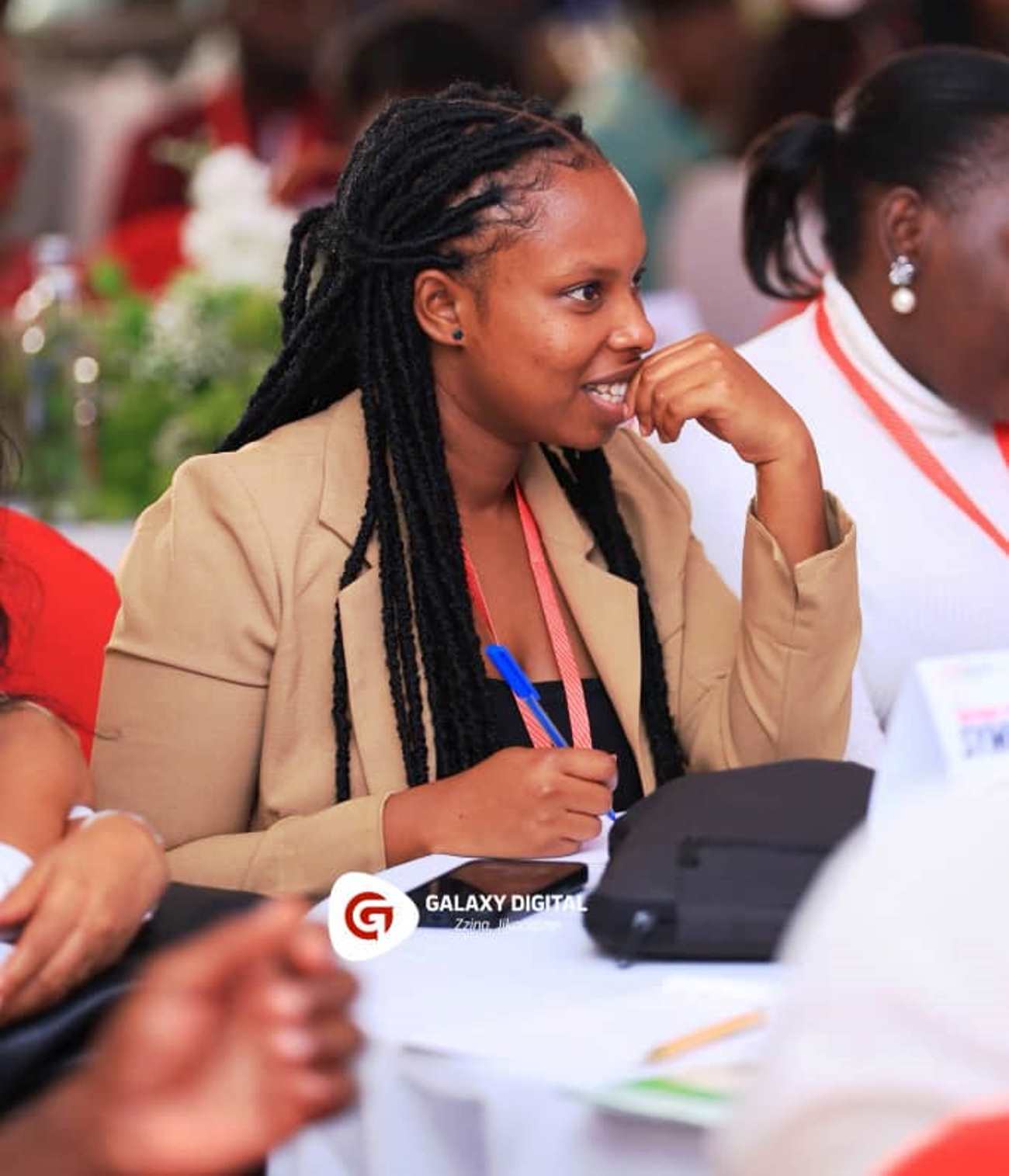
She wanted theory anchored in practice. And then there was the commute.
From Nabbingo, a hill in Wakiso District, some 18.6 km to Kampala, where the Makerere Main campus is situated, and back, nearly 20 hours a week dissolved into Kampala traffic. Two-hour journeys before 8:00 a.m. lectures. Dust. Noise. Headaches. She learned to manage energy the way others manage time. Fatigue became a tutor in resilience.
“I had to be intentional with every remaining hour,” she says. “Excuses were not an option.”
Learning to Practice Communication
If classrooms taught her analysis, presentations taught her courage. Pitching projects, defending research, and standing before peers quick to critique forced her to think on her feet. She was no longer simply studying communication; she was practicing it.
In 2024, the AGMES Fellowship at the Aga Khan Graduate School of Media and Communication pushed her further. She received funding to produce a capstone project on the mental impact of gender-based violence on survivors. She identified sources, conducted interviews, handled trauma with care, and worked with professional editors.
The Communication, she learned, is logistics and ethics as much as eloquence.
The Future She Sees
Whitney is optimistic about Uganda’s media landscape. The digital shift, she believes, has democratized influence. Young communicators are no longer confined to legacy newsrooms or offices.
Yet she sees a gap in the absence of structured research on sustainable, ethical, profitable independent media ventures in Uganda. Her ambition is not only to practice communication, but to study it. To produce data-backed frameworks that help young Ugandans transition from graduates to media entrepreneurs.
She wants to make the impact scalable.
What Remains
As the only First-Class graduate in her cohort, she is careful not to mythologize herself. “Success isn’t brilliance alone,” she says. “It’s a daily commitment when nobody is watching.”
Even before graduation, Whitney had stepped into the industry through a mentorship internship at Capital One Group (COG EA Ltd), a strategic marketing communications agency operating across East Africa.
At Capital One Group, we spoke to Paul Mwirigi Muriungi, the Managing Director and Head of Strategy, who spoke of Najjuka as a progressive and intentional young professional who approaches her work with curiosity, maturity, and responsibility.
“Her attitude is exemplary. She is teachable, receptive to feedback, and eager to grow. While technical skills can be taught, character, work ethic, and mindset determine long-term success, qualities that Whitney consistently demonstrates. Given her academic excellence and professional application, we believe she has a bright future both at Capital One Group and within the wider communications industry. She represents the kind of talent the profession needs: thoughtful, adaptable, and committed to excellence.
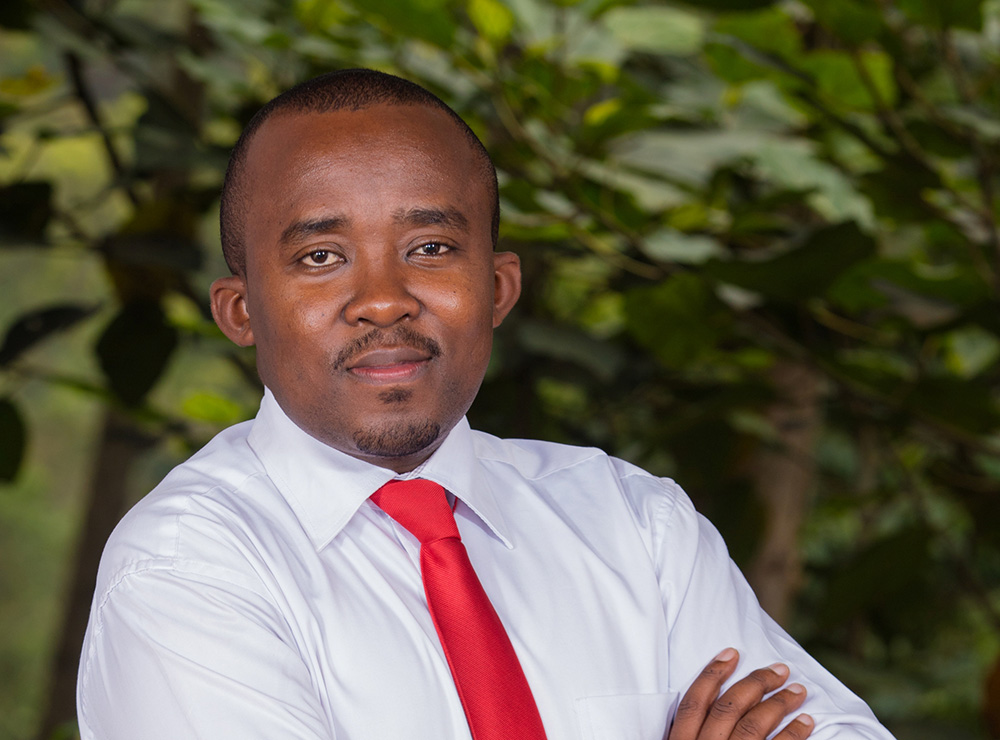
“We look forward to seeing her next chapter unfold,” says Mwirigi.
Najjuka’s gaze extends beyond her own trajectory. She speaks of what the Department could become. Furnished and equipped with industry-standard equipment, newsroom simulations, and deeper investment in data journalism as prayers. Her excellence is not self-congratulatory, but it is forward-looking.
“The University should support the Department to procure industry-standard equipment. Access to high-quality cameras, sound booths, and updated editing software like Adobe Creative Suite is critical to our learning environment,” she says.
Adding that, “We need a newsroom simulation, a physical or digital space where students work under real-time deadlines to produce content for the public. That would prepare us for industry and even strengthen the University’s own media platforms.”
In an era defined by metrics, algorithms, and digital traceability, data journalism is no longer a niche skill but a sine qua non of credible reporting. “There should also be more focus on data journalism and search engine optimization. These are no longer optional skills. Students would benefit immensely from stronger training in these areas.”
Dr. Aisha Nakiwala, the Head, Department of Journalism and Communication, says the faculty are very proud that she is graduating with a First Class—the only one in this year’s cohort.
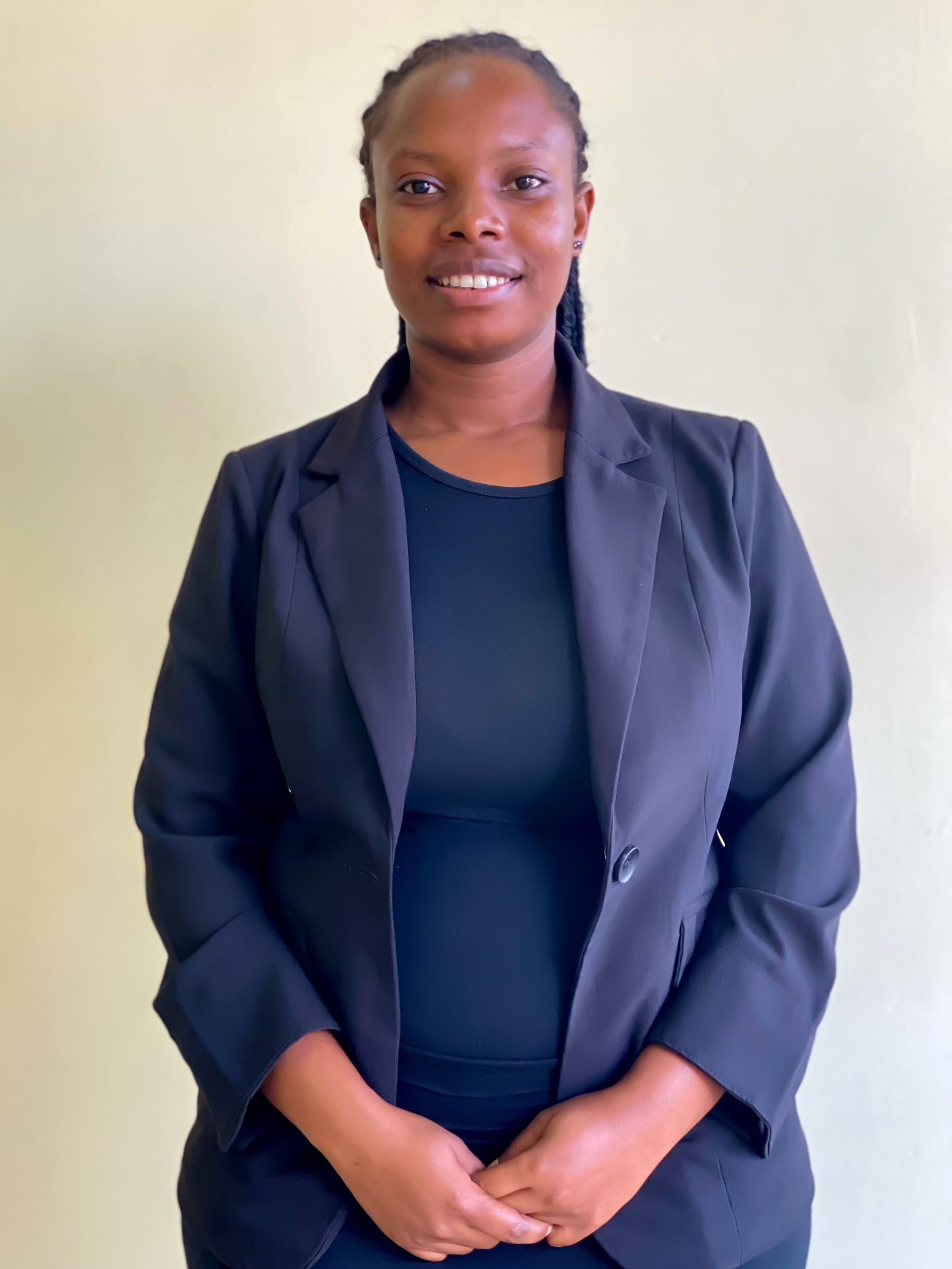
“This achievement reflects not only exceptional intellectual ability but also discipline, resilience, and sustained dedication to the highest standards over four years. Graduating with first-class honors is no small feat; it requires consistent outstanding performance.
“Her accomplishment sets a powerful example for continuing students and reaffirms our department’s commitment to nurturing excellence. We are confident she will make meaningful contributions to the communication profession and society at large,” says Dr. Nakiwala.
On graduation day, applause will crest and recede. The gowns will fold back into wardrobes. The transcripts will be filed away in cabinets. But something quieter will endure; a young woman from Nabbingo who once missed her Law mark, who spent 20 hours a week on the road, who discovered that storytelling is power, and who now walks into Freedom Square not by accident, but by intention.
Life, as she has come to understand it, lives on.
Humanities & Social Sciences
Dr. Pamela Khanakwa Honored for Steering Record 18 PhD Candidates for the Mak 2026 Graduation
Published
1 month agoon
January 23, 2026By
Jane Anyango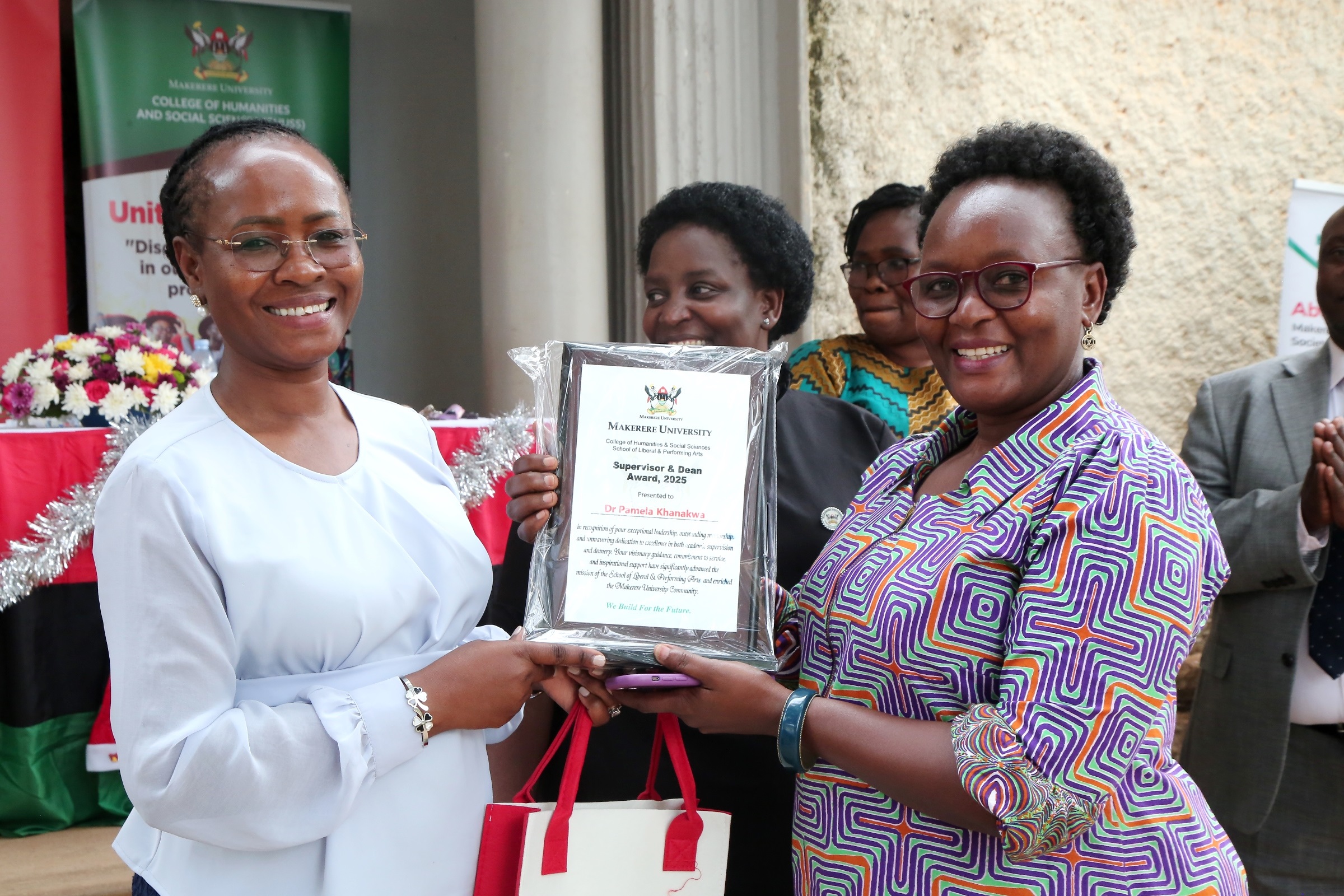
Six personally supervised, three completed in record time, as School of Liberal and Performing Arts sets a historic milestone. Dr. Pamela Khanakwa got the Award as Best PhD Supervisor and Dean
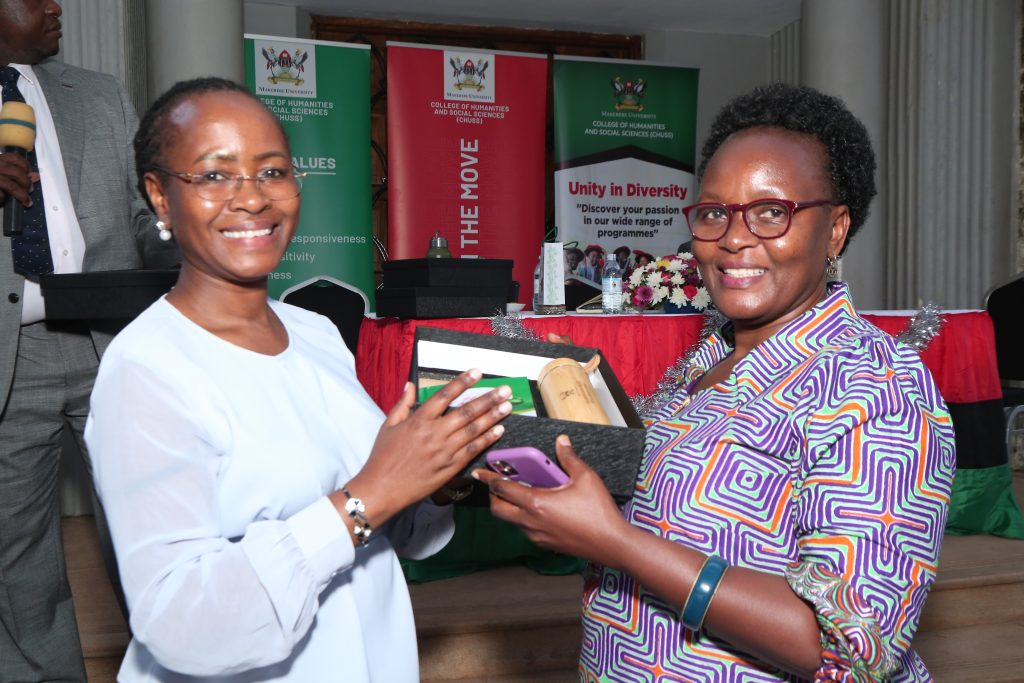
A Historic Academic Milestone for SLPA
The College of Humanities and Social Sciences (CHUSS) recognised the Dean of the School of Liberal and Performing Arts (SLPA), Dr. Pamela Khanakwa, for outstanding academic leadership that has seen the School field 18 PhD candidates for the next 2026 Makerere University Graduation Ceremony scheduled for 24th-27th February. Remarkably, six of these doctoral graduates were directly supervised by Dr. Khanakwa, with three completing within the official three-year timeframe, an exceptional achievement in graduate training. The recognition was announced during the CHUSS End-of-Year Get-Together, where staff applauded Dr. Khanakwa’s dedication, humility, and relentless commitment to postgraduate supervision and timely completion.
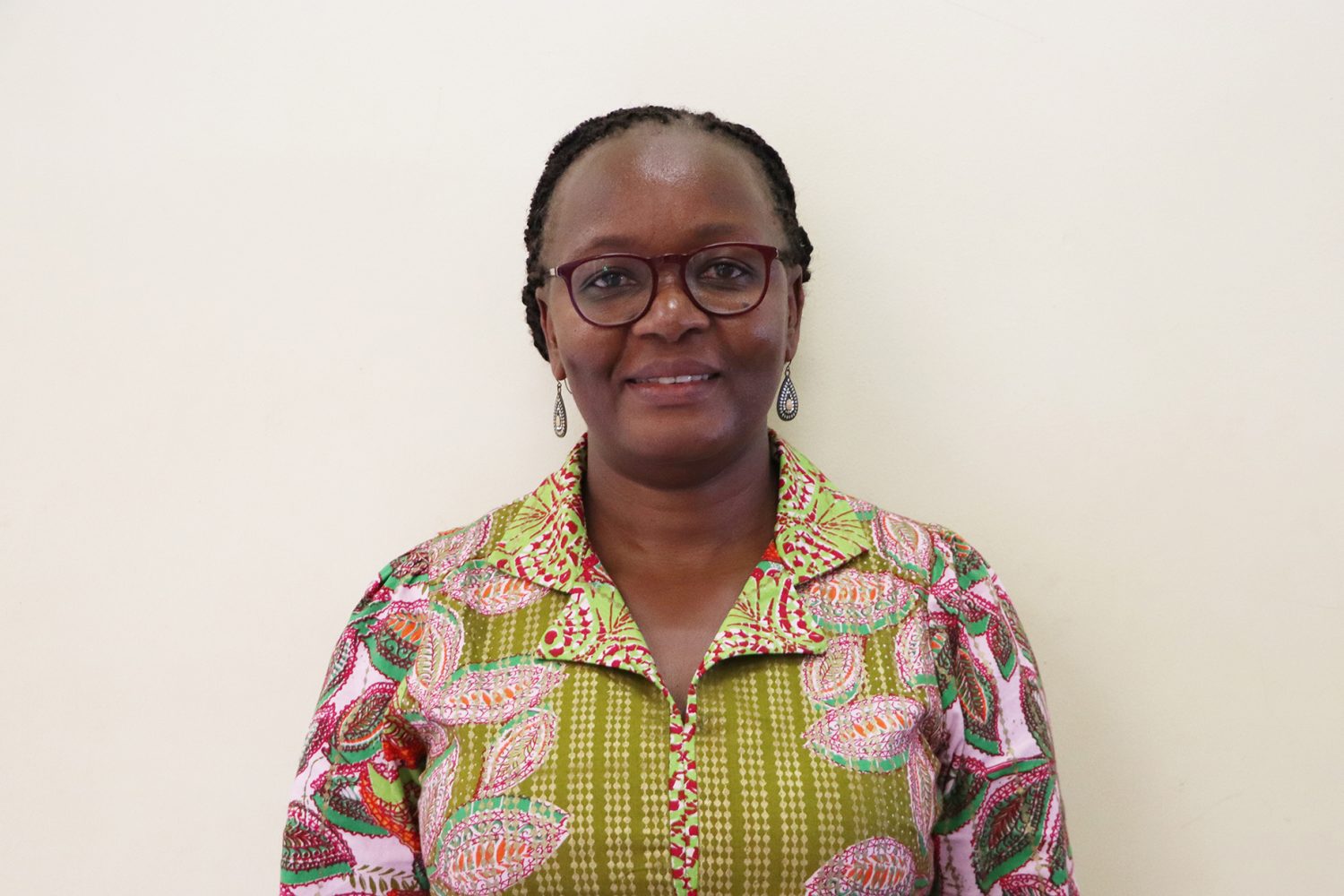
Message to Academic Staff
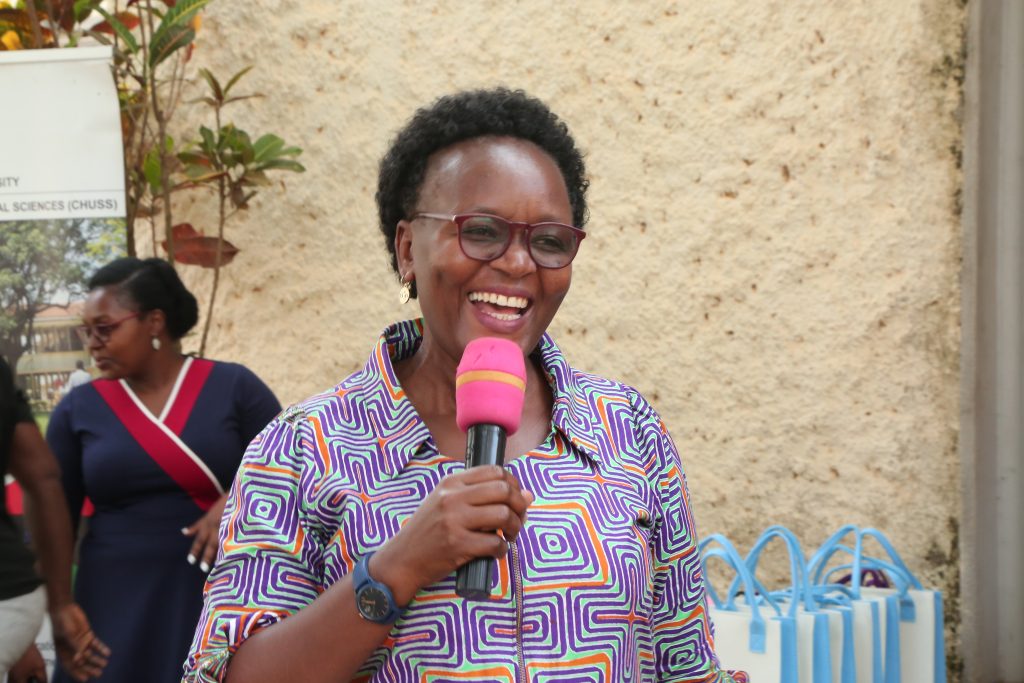
Q: What message do you have for your staff following this achievement?
Dr. Khanakwa:
First, I celebrate my staff and thank them for their dedication to supervision and student support. Academic work is demanding, and material rewards are often limited, but the true satisfaction comes from seeing students succeed.
I encourage my colleagues to remain committed. Yes, the workload is heavy, but many things are possible with dedication and teamwork. Let us continue working for the good of our students, our School, and Makerere University.
Leadership Rooted in Humility
Q: Many colleagues describe you as humble, down to earth, and hardworking. What shapes this character?
Dr. Khanakwa:
I think it is largely my upbringing. My mother was a primary school teacher from the 1950s until the mid-1980s. She worked extremely hard to raise us, combining teaching with farming to ensure we had school fees and basic needs. From her, I learned humility, discipline, and the value of hard work.
I also learned that leadership positions are temporary. You occupy them today, and tomorrow you move on. So humility is essential.
My graduate training also shaped me significantly. My PhD supervisor emphasized that graduate study is a full-time job and that results matter more than noise. Let people see your work through outcomes, not announcements.
Supervision as a Two-Way Commitment
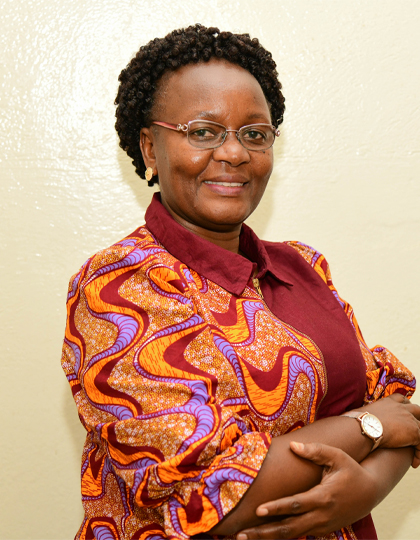
Q: How would you describe your supervision style?
Dr. Khanakwa:
I read my students’ work thoroughly, word by word. Sometimes my comments are tough, but they are honest. Supervision is a two-way commitment. I give feedback, but students must also respond and remain engaged. When that relationship works, progress happens.
Balancing Leadership, Scholarship, and Family
Q: How do you balance being a Dean, scholar, wife, mother, and daughter?
Dr. Khanakwa:
Honestly, I am not sure I balance perfectly. My mother lives far away in Bukwo, so visiting requires careful planning. My children grew up understanding the demands of academic life. I pursued my PhD in the United States and spent long periods away, but we adapted as a family.
Work has become part of my lifestyle. I use weekends to read dissertations, review manuscripts, and write. Sometimes my children ask if I ever sit without working, but this is the commitment I made. As we often say jokingly, “We humbly applied for the job, so let us do the job.”
Scholarship Beyond Supervision
Dr. Khanakwa is also an active scholar and editor. In the past year alone, she has:
- Edited scholarly volumes on archives, memory, method, and pedagogy
- Published a book with Routledge Companion
- Co-authored journal articles and book chapters with graduating students, including Priscah Asiimwe and Anatoli Lwasa Mpijja
“I feel an obligation to write with students,” she notes. “It takes time, energy, and commitment, but it is part of academic mentorship.”
Who Is Dr. Pamela Khanakwa?
Dr. Pamela Khanakwa is the Dean, School of Liberal and Performing Arts, College of Humanities and Social Sciences, Makerere University. She is a seasoned scholar, supervisor, administrator, and mentor whose leadership continues to redefine graduate training excellence. Details about Dr. Pamela Khanakwa can be accessed at: https://chuss.mak.ac.ug/en/personnel/pamela-khanakwa/
More details are available in her attached curriculum vitae.
The CHUSS End- Of-Year-Get-Together
On 12th December, 2025 the college leadership organised a get-together end of year gathering to take stock of the achievements, challenges and brainstorm together on how to move forward. The event was marked by entertainment, team building games, appreciation speeches, sharing a meal and a Christmas package for every staff
Retirees and staff recognised
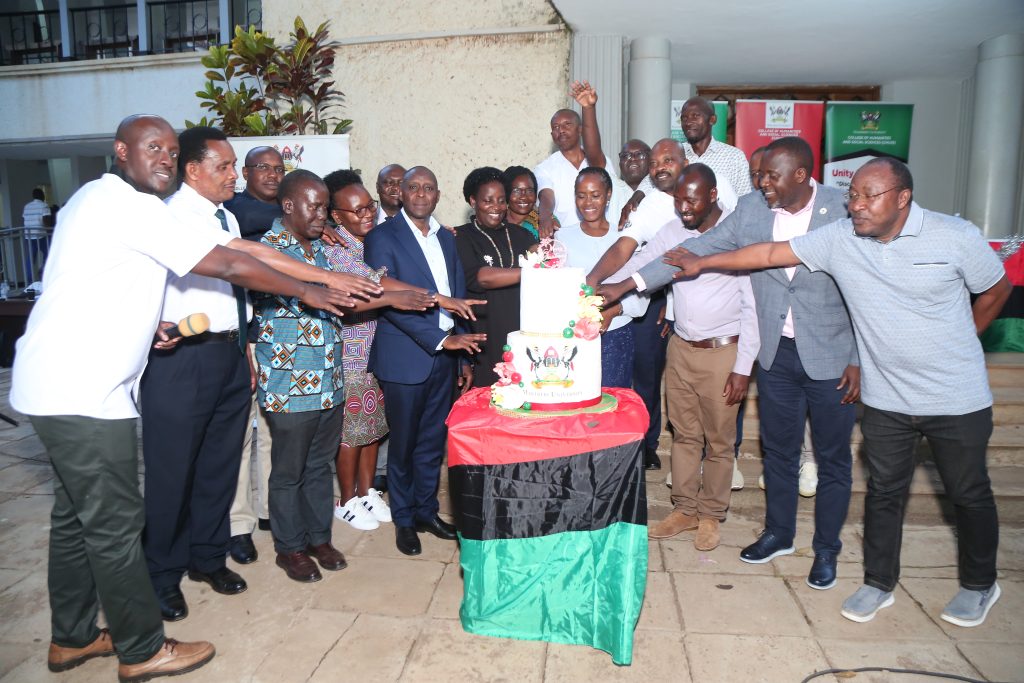
Five retired staff Dr. Micheal Wangotta Masakala, Dr. Anatole Kirigwajjo and Dr. Jackson Kizza Mukas (all from the School of Languages, Literature and Communication), Assoc. Prof. Florence Nansubuga (School of Psychology), Dr. Tusabe Gervase (School of Liberal and Perforing Arts) and Ms. Scovia Nganda Sekweyama (secretary from the School of Social Sciences) were recognised for their dedicated services to the university.
In addition to Dr. Pamela Khanakwa’s Award as Best PhD Supervisor and Dean, Ms. Birabwa Florence scooped the award of Best Registrar of the year. Birabwa is the registrar for the School of Liberal and Performing Arts.
Administrative and support staff including Ms. Mary Gyezaho and Annet Kashumbusha(both administrative secretaries in the Principals office), Farouq Lule (IT Officer), Godfrey Kakooza (cleaner), Charles Sebuguzi (driver) and Jane Anyango (Communications officer) were recognise with awards for outstanding service. Dr. Mohamed Mayanja Kajumba was from the School of Pyschology was recognised as the person with an outstanding talent in Handwriting.
The celebrations held in the Arts quadrangle were graced by the Vice Chancellor Academic Affairs Prof. Sarah Ssali and the Deputy Vice Chancellor in charge of Finance and Adminstration Prof. Ireeta Tumps.
Humanities & Social Sciences
Ugandan Journalists Trained on Peace and Gender-Sensitive Reporting Ahead of 2026 Elections
Published
2 months agoon
January 9, 2026By
Jane Anyango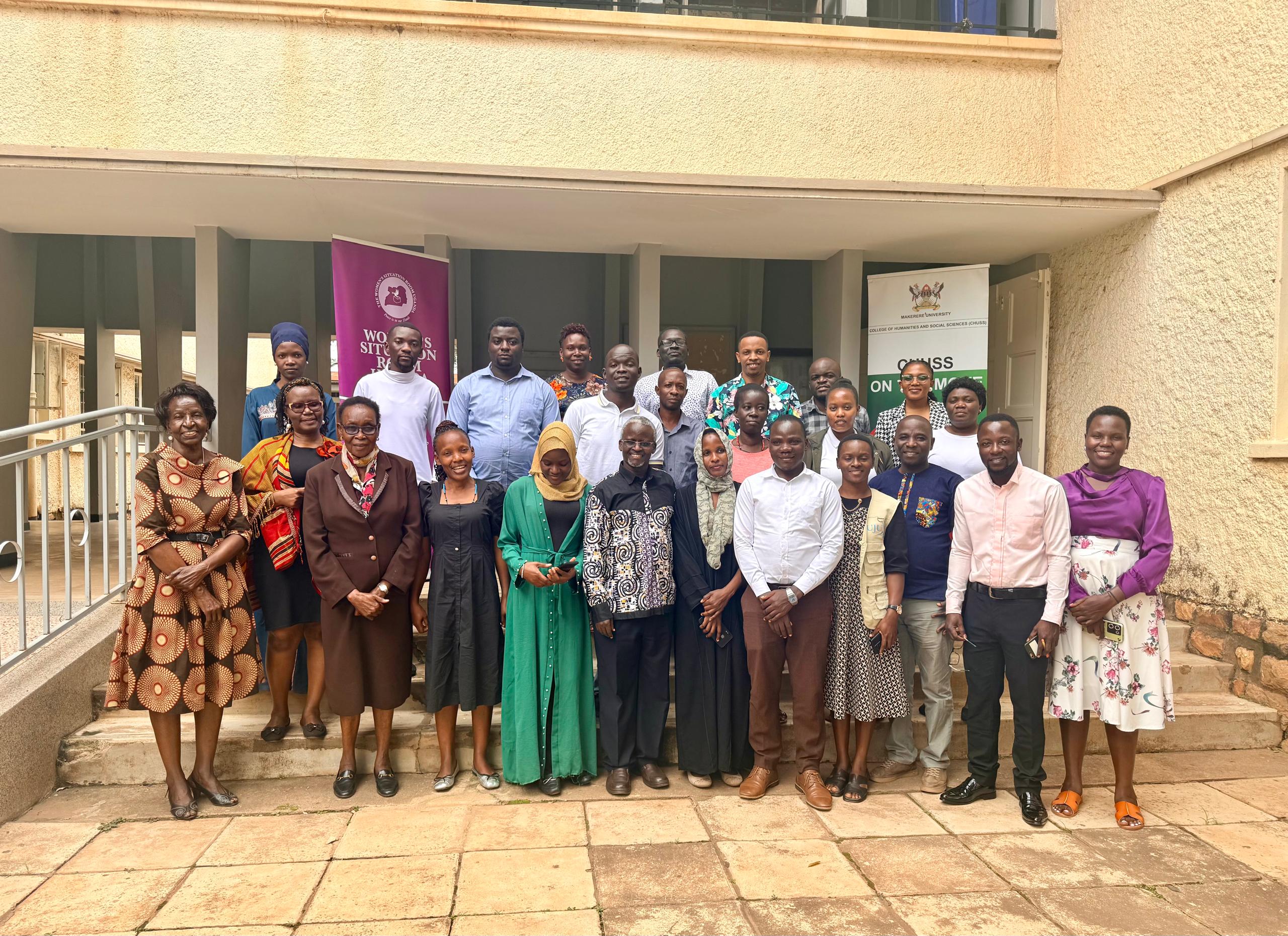
Kampala, Uganda – January 9, 2026
Ahead of the January 15 general elections, Ugandan journalists have undergone specialized training on peace and gender-sensitive reporting to ensure responsible media coverage during the election period. The two-day training, held from 8th to 9th January 2026 at Makerere University’s College of Humanities and Social Sciences Smart Room, was organized by the Women’s Situation Room (WSR) in partnership with various stakeholders and brought together journalists from across print, broadcast, and online platforms.
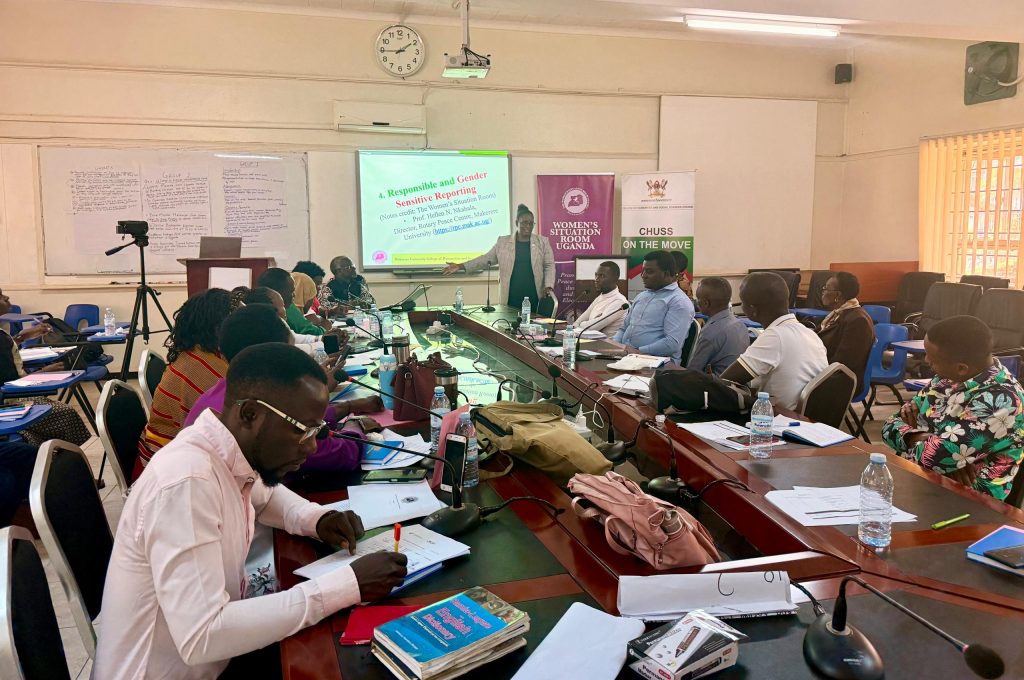
The main objective of the training was to strengthen the capacities of media in reporting and documenting electoral processes in a responsible and gender-sensitive manner. The specific objectives included: strengthening journalists’ skills to cover the 2026 elections in a fair, balanced, gender-sensitive, and non-violent partisan way; enhancing the role of media to enable citizens to be well-informed and actively participate in the election process; ensuring focused and balanced reporting on peace during and after elections; and strengthening partnerships between the WSR and media houses during the election period.
The training covered multiple critical modules. Day one focused on responsible conflict-sensitive reporting, emphasizing principles such as balance, impartiality, and accuracy. Participants explored the role of media as a relayer of the population’s voice, election monitor, catalyst for social cohesion and reconciliation, contributor to the accountability of political actors, and a platform for detecting and debunking digital media misinformation and hate speech.
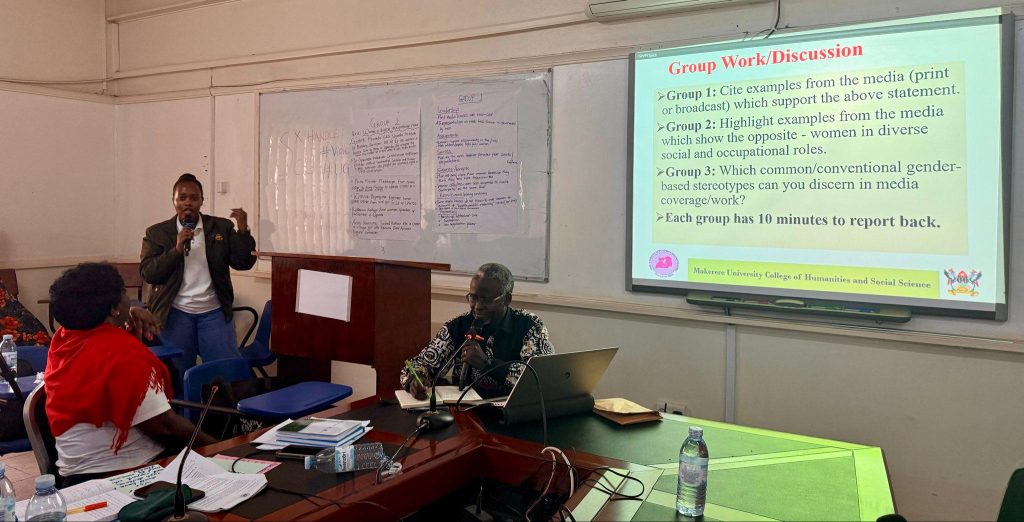
Day two addressed responsible and gender-sensitive reporting. Key aspects included the definition of gender-sensitive reporting, how to become a gender-sensitive reporter, critical elements in reporting with gender awareness, packaging gender-sensitive stories, and a checklist for detecting and avoiding gender-insensitive reporting.
Her Lordship, retired Judge Justice Mary Mayitum, emphasized the importance of peace as the foundation of development and democratic engagement. “Because we value peace more than anything. Without peace, really, you can do nothing. But where there is peace, you can have time to reflect, discuss with others, and join in meaningful dialogue,” she said. She warned that the country’s past conflicts, such as those in Gulu, underscored the necessity of maintaining national harmony.
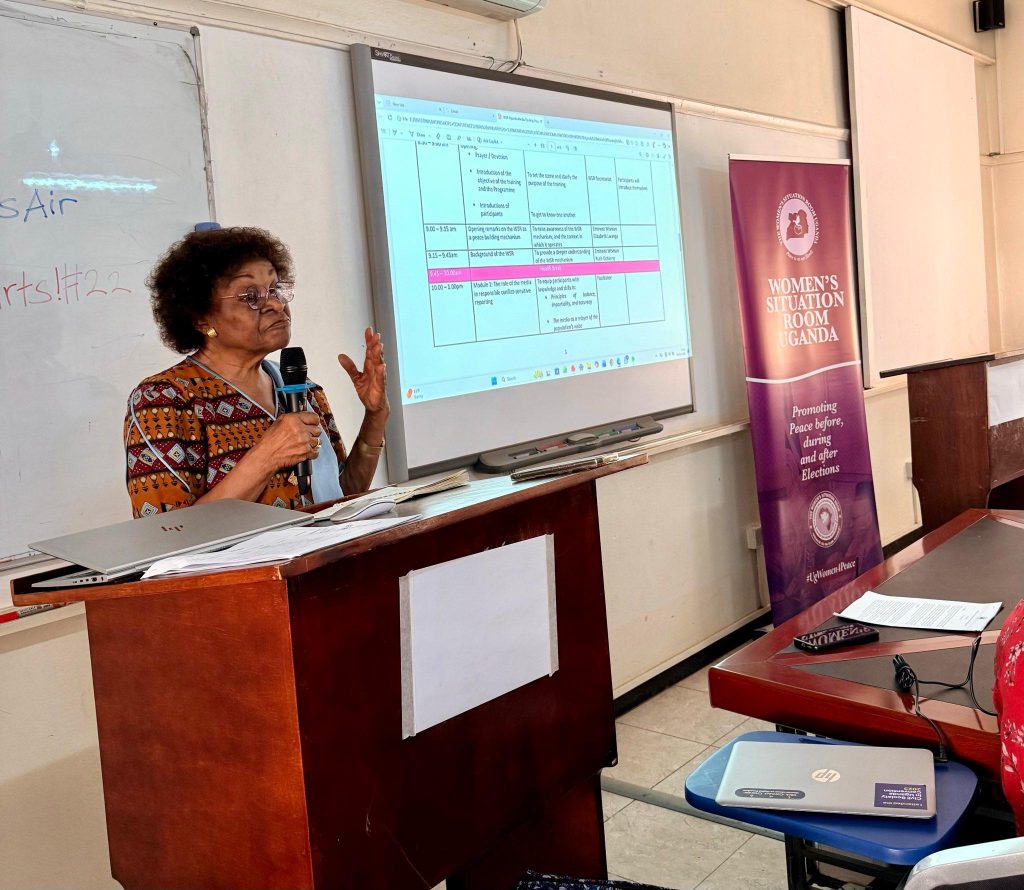
Justice Mayitum also urged other key election stakeholders to uphold peaceful conduct. “Being peaceful is the very heart of life. We have spoken to police, security personnel, political parties, and the Electoral Commission. We want politicians to have a code of conduct and to understand that it’s okay to think differently without fighting or hating one another,” she added.
Dr. William Tayebwa, lead facilitator and senior lecturer in the Department of Journalism and Communication at Makerere University, said, “This training is about conflict-sensitive reporting, peace journalism, and gender-sensitive reporting in the context of the elections. The emphasis was on giving female political candidates a voice while ensuring journalists report responsibly on election-related matters.”
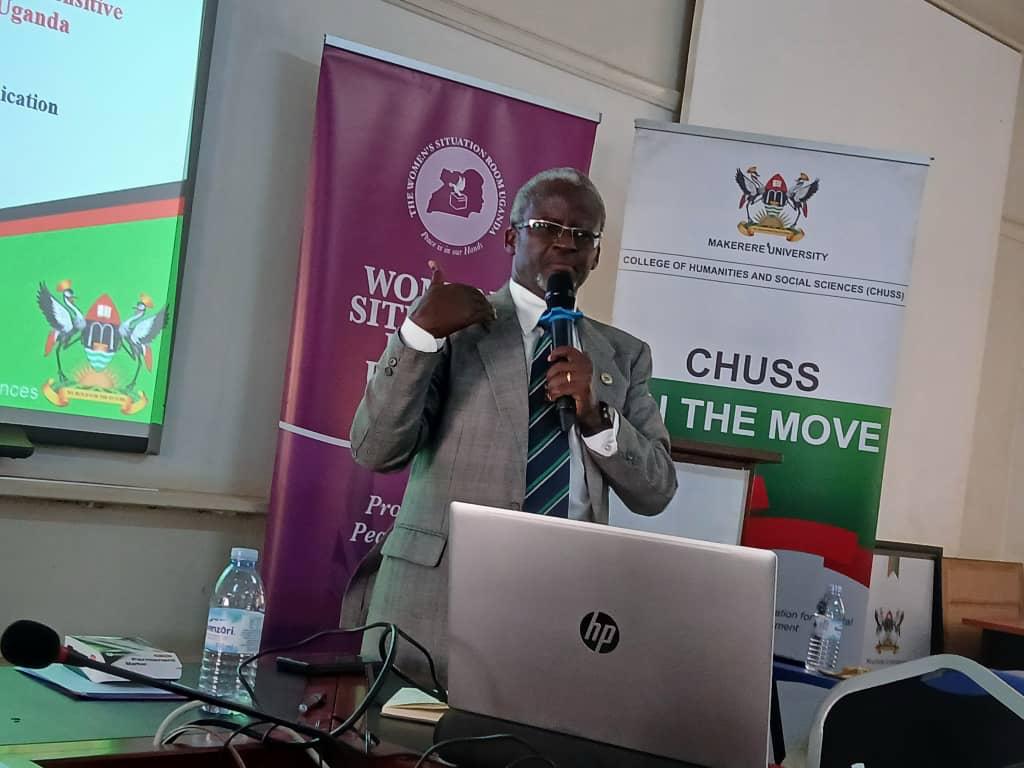
Participants described the training as timely and impactful. Tony Banizengabo of CBS Wakiso District said, “We’ve benefited a lot. We’ve been trained to write stories which bring peace, not conflict. Ahead of the elections, we are very ready to be part of peacemakers.”
Dorcas Kimono of UBC TV Kampala added, “It was so timely and rich. We learned how to report without promoting or fueling violence, giving voice to victims without angering them or encouraging violators. This is very vital, especially as we approach the 2026 elections.”
The training aims to equip media personnel with the knowledge and skills to uphold professional ethics while contributing to a peaceful, inclusive, and gender-sensitive electoral process.
Trending
-

 Humanities & Social Sciences1 week ago
Humanities & Social Sciences1 week agoMeet Najjuka Whitney, The Girl Who Missed Law and Found Her Voice
-

 General1 week ago
General1 week ago76th Graduation Highlights
-

 Health2 weeks ago
Health2 weeks agoUganda has until 2030 to end Open Defecation as Ntaro’s PhD Examines Kabale’s Progress
-

 Agriculture & Environment2 weeks ago
Agriculture & Environment2 weeks agoUganda Martyrs Namugongo Students Turn Organic Waste into Soap in an Innovative School Project on Sustainable Waste Management
-

 General2 weeks ago
General2 weeks agoMastercard Foundation Scholars embrace and honour their rich cultural diversity
